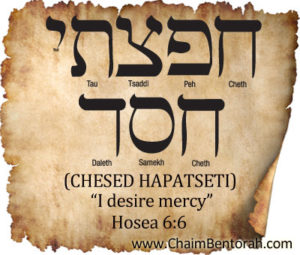HEBREW WORD STUDY – I DESIRE MERCY – CHESED HAPATSETI חסד חפצתי Cheth Pei Sader Taw Yod Cheth Samek Daleth
Hosea 6:6: “For I desire mercy and not sacrifice, and knowledge of God more than burnt offerings. “
 Is it not odd that a pronoun (I) is used in the first phrase but in the second phrase the name God is used. Grammatically it should be “knowledge of me.” I believe this is one of those little hints, remez as the sages like to call it. Now the literal meaning is quite clear. God isn’t interested in all our outward forms of worship, only that which comes from the heart.
Is it not odd that a pronoun (I) is used in the first phrase but in the second phrase the name God is used. Grammatically it should be “knowledge of me.” I believe this is one of those little hints, remez as the sages like to call it. Now the literal meaning is quite clear. God isn’t interested in all our outward forms of worship, only that which comes from the heart.
I once asked a rabbi how they could worship God when the temple was destroyed and they could no longer offer their sacrifices. He gave me this passage and explained that worship really comes from the heart and not from the performance of certain rituals. He explained that this is why so many Jews go into medicine and other humanitarian works; serving and caring for others is one of their highest forms of worship for God loves giving mercy and kindness than receiving gifts and offerings, you know more blessed to give than receive?
To most Christians worship is going to church on Sunday, singing some I like God songs and making it through a 45-minute sermon. But worship is not the music, not the lifted hands, not even a preacher’s sermon. Jews for almost 2,000 years have been deprived of their place of worship and the tools of worship, yet they still worship God, every day in their prayers, in acts of mercy and in their study of Torah.
After I finish my three or four hours of study I try to have a time of worship. In studying this verse I realized that I have been worshipping God all along during my time of study. When I was a newbie on the disability bus I had to work on Sundays and drive disabled and seniors to church. These Catholics have it made, in and out in 45 minutes, you can set your clock to it. I have yet to meet a long-winded priest. If he preaches more than 15 minutes people start calling him a Baptist. I know this because I would sneak into the local mass as I was unable to attend my own church. You see I was just as much deprived of my opportunity to worship as the Jews were after the destruction of the temple in 70 AD. But in truth, I was only deprived of attending my house of worship, but like my Jewish friends, I could worship through my prayers, study and any acts of mercy I might have to opportunity to offer.
So what about this little hint of something deeper in the use of a proper noun (God) rather than a personal pronoun me? The syntax here is very ambiguous but it is generally agreed and rightly so that God is saying he desires mercy and loving kindness from us rather than our sacrifices of time, money or however else we can make a sacrifice. Yet, as I said, the syntax is ambiguous and leaves room for a parallel rendering. The use of the pronoun (I) suggests something very personal. On another level we could render the syntax like this: “I desire to offer lovingkindness rather than receive sacrifices.” God does not need our sacrifices or offerings, He owns the cattle on a thousand hills. What He does need and longs for is to share his loving kindness with the unbeliever and He needs us to do that. As the old song goes, “We may be the only Jesus that people will see.” An I like God song is nice, I am sure He appreciates it, but He is the author of more blessed to give than receive and when we are the instruments to share His mercy and loving-kindness, well apparently from Hosea 6:6 God gets more of a charge out of giving mercy that listening to us sing our I like God songs.








I enjoyed your teaching about. Saul and the evil spirit. V.9 is where Saul turned from God. And then the “evil” spirit came. Your teaching it really was a good Spirit and Saul then manifested his evil spirit. God didn’t give up on Saul. That explaination on the translation was so encouraging. We must not turn from God!
Shalom Chaim Bentorah, and Sabbath Shalom!
To day you gave me a devotion-lesson that go right into my heart and gave hope and comfort to a guy like me that struggle with Bipolar-issue and depression almost every day. The result of my condission make it difficult for me to go to my congregation ( low-church), I dont manage to be in the room and listen to the sermons.
BUT, but my little office is my church and sanctuary where I am with Yeshua every dag ( day long).
Now I found peace in todays devotion from your hand!
Thank you Chaim!
Roy
Thank you for sharing Roy